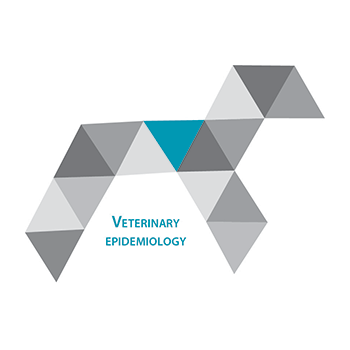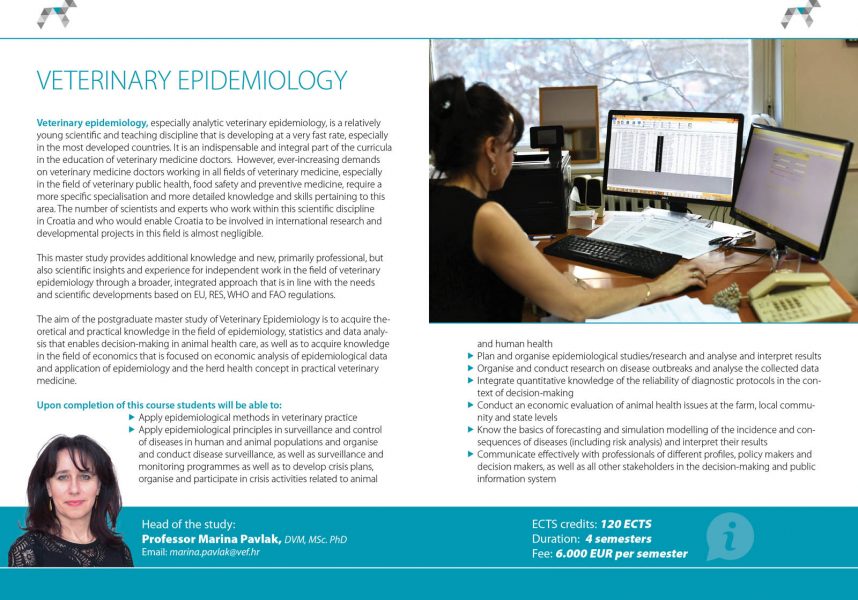Veterinary epidemiology, especially analytic veterinary epidemiology, is a relatively young scientific and teaching discipline that is developing at a very fast rate, especially in the most developed countries. It is an indispensable and integral part of the curricula in the education of veterinary medicine doctors. However, ever-increasing demands on veterinary medicine doctors working in all fields of veterinary medicine, especially in the field of veterinary public health, food safety and preventive medicine, require a more specific specialisation and more detailed knowledge and skills pertaining to this area. The number of scientists and experts who work within this scientific discipline in Croatia and who would enable Croatia to be involved in international research and developmental projects in this field is almost negligible.
This master study provides additional knowledge and new, primarily professional, but also scientific insights and experience for independent work in the field of veterinary epidemiology through a broader, integrated approach that is in line with the needs and scientific developments based on EU, RES, WHO and FAO regulations.
The aim of the postgraduate master study of Veterinary Epidemiology is to acquire theoretical and practical knowledge in the field of epidemiology, statistics and data analysis that enables decision-making in animal health care, as well as to acquire knowledge in the field of economics that is focused on economic analysis of epidemiological data and application of epidemiology and the herd health concept in practical veterinary medicine.
Upon completion of this course students will be able to:
- Apply epidemiological methods in veterinary practice
- Apply epidemiological principles in surveillance and control of diseases in human and animal populations and organise and conduct disease surveillance, as well as surveillance and monitoring programmes as well as to develop crisis plans, organise and participate in crisis activities related to animal and human health
- Plan and organise epidemiological studies/research and analyse and interpret results
- Organise and conduct research on disease outbreaks and analyse the collected data
- Integrate quantitative knowledge of the reliability of diagnostic protocols in the context of decision-making
- Conduct an economic evaluation of animal health issues at the farm, local community and state levels
- Know the basics of forecasting and simulation modelling of the incidence and consequences of diseases (including risk analysis) and interpret their results
- Communicate effectively with professionals of different profiles, policy makers and decision makers, as well as all other stakeholders in the decision-making and public information system
ECTS points: 120 ECTS
Duration: 4 semesters
Fee: 5.000 EUR per semester
Head of the study: Professor Marina Pavlak, DVM, MSc. PhD
email: marina.pavlak@vef.hr

Great news!
This postgraduate master course has entered the final stage of accreditation at the University of Zagreb. So we expect to be enrolling new students in the Fall of 2021. Stay tuned and watch the news on our webpage!
prof. dr. sc. Marina Pavlak

- E: marina.pavlak@vef.hr
- T: 01/2390-130
prof. dr. sc. Ksenija Vlahović

- E: ksenija.vlahovic@vef.hr
- T: 01/2390-145
prof. dr. sc. Dean Konjević

- E: dean.konjevic@vef.hr
- T: 01/2390-131
doc. dr. sc. Denis Cvitković

- E: denis.cvitkovic@vef.hr
- T: 01/2390-309
prof. dr. sc. Andreja Prevendar Crnić

- E: apcrnic@vef.unizg.hr
- T: 01/2390-160
Obligatory courses
| Introduction to veterinary epidemiology |
| Epidemiological methods |
| Observational epidemiology |
| Environmental, landscape and occupational epidemiology |
| Data management in veterinary epidemiology |
| Statistical methods in veterinary epidemiology and population health I |
| Statistical methods in veterinary epidemiology and population health II |
| Animal health and food safety in international trade |
| Animal health programme planning and evaluation |
| Applied epidemiology I:
Animal health surveillance – design and evaluation of disease control programmes |
| Animal health regulations and risk analysis |
| Applied epidemiology II: Disease outbreak management |
| Simulation modelling in veterinary epidemiology and veterinary public health |
| The geographic information system and spatial analysis |
| Animal health economics |
| Molecular epidemiology |
| Elective courses |
| Biomedical data mining |
| Estimating the costs of diseases and control policies |
| Veterinary clinical epidemiology |
| Comparative epidemiology |
| Toxicoepidemiology |
| The epidemiological approach in designing clinical research |
| The epidemiological approach to veterinary medical mycology |
| Mandatory elective |
| One Health |

 Faculty of
Faculty of 
